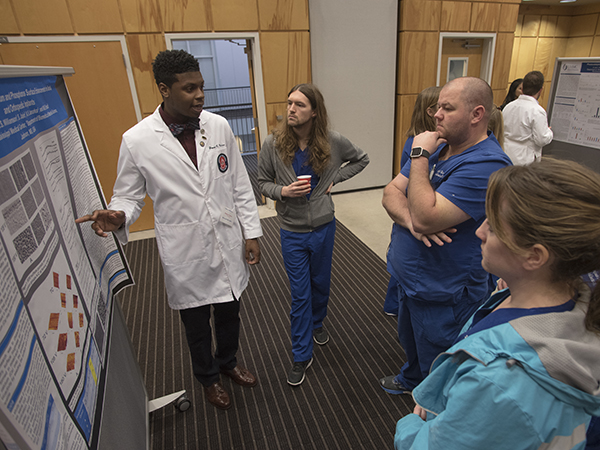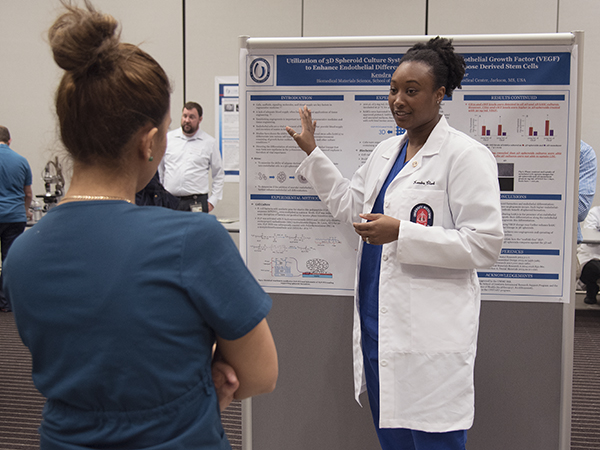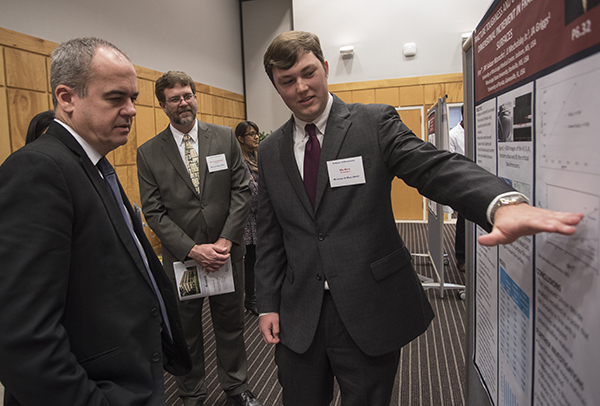Students sink teeth into dental research

Published in News Stories on February 23, 2017
Sixteen students presented their research at the 2017 School of Dentistry research day February 21 in the Norman C. Nelson Student Union at the University of Mississippi Medical Center.
“This has been an exciting year for research in the School of Dentistry,” said Dr. Jason Griggs, associate dean for research and professor and chair of Biomedical Materials Science.
The school's faculty received more than $1 million in research funding this fiscal year, 39 percent more than last year. This increase helps make research possible for dental students like Kendra Clark and Jiman Nelson, who won awards for their poster presentations Tuesday.
Clark, a third-year student, won the Hinman Student Research Award. She studies ways to use vascular endothelial growth factor, or VEGF, to promote regeneration in tissues without sufficient blood vessels.
“A decrease in blood supply can limit the effectiveness of a graft, which means it could fail,” said Clark, who is the UMMC and national president of the National Student Research Group for dentistry.

Lana Jabaji, D2, foreground, listens to Kendra Clark, D3.
Clark generated endothelial cells, the cells that make up the inner layer of blood vessels, from human adipose stem cells. She found that adding VEGF to the cell culture helps the cells form structures that are more similar to blood vessels.
Nelson, also a D3, won the American Dental Association/Dentsply Student Clinician Research Award for his work on titanium used in dental and orthopaedic implants.
When electrically charged, tiny crystals form on titanium's surface. These crystals have unique properties, Nelson said, such as antimicrobial effects and bioactivity. By better understanding these characteristics, engineers can enhance them in ways to decrease the risk of infection or implant rejection after surgery.
Clark and Nelson's awards will enable them to present their work later this year at national conferences in Memphis and Atlanta, respectively.
“The school's research portfolio is growing and changing,” Griggs said, noting the diversity of projects at the event. Faculty-led research at the school used to focus on implants and orthopaedics, he said. Now, it includes tissue engineering, preventive care and clinical techniques, all represented by the students.
The keynote speaker brought an additional expertise to Research Day. Dr. Jacques Nör, professor of dentistry and chair of the Department of Cariology, Restorative Sciences and Endodontics at the University of Michigan, discussed the “Therapeutic targeting of head and neck cancer stem cells.”

Nör and Griggs listen as Bo Key presents his research. Key, a senior at Mississippi State University, will join UMMC as a first-year dental student this fall.
The Nör lab found that cisplatin, the drug most commonly used to treat head and neck cancers, doesn't kill cancer stem cells, only the other tumor cells.
In fact, “cisplatin increases self-renewal,” he said, which makes eliminating cells known for their ability to move and proliferate in the body more challenging.
Nör is now studying an anti-inflammatory drug, tocilizumab, that could “disrupt the niche” where these cells live: near blood vessels.
In their laboratory experiments, “treating with antibodies inhibited the recurrence of migration or metastasis,” Nör said. Next, he wants to test the drug in a clinical trial with cancer patients.
Nör encouraged students interested in research to pursue “questions that challenge existing paradigms.” However, he said that experience with research is valuable for all dentists.
Likewise, the University of Mississippi School of Dentistry encourages all students to participate in research during their training.
“It's important that students conduct research even if they don't intend to become researchers,” Griggs said. “When they enter clinical practice as dentists, their education doesn't stop. They must be able to evaluate new methods and materials to use in their practice.
“Research experience teaches problem solving, critical thinking and builds the foundation for evidence-based dentistry.”


